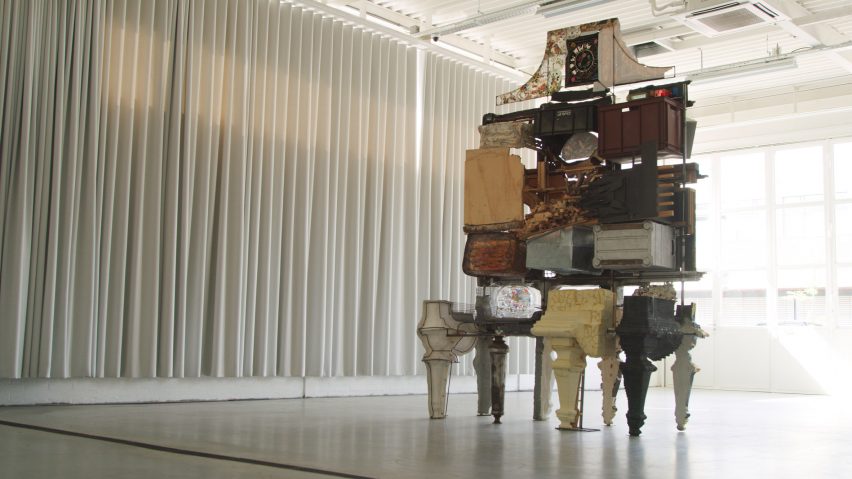Dutch Design Week drew to a close this weekend and, as usual, the Design Academy Eindhoven exhibition was one of the highlights. Design editor Alice Morby has selected 10 of the most promising students from the show.
Design Academy Eindhoven is regarded as one of the most influential design schools in the world. As with previous years, the university's graduate show took place as part of Dutch Design Week at the Eindhoven campus, from 21 to 29 October 2017.
Here, over 175 projects were on show from Design Academy's undergraduate and postgraduate students, and ranged from practical products to more conceptual art-focused pieces.
Here are 10 designers we predict big things from in the coming years, following in the footsteps of alumni such as Maarten Baas, Hella Jongerius and Marcel Wanders.
Kostas Lambridis
Kostas Lambridis' monumental, maximalist cabinet was the last thing visitors saw before they left the show, and is based on the 18th-century Badminton cabinet that twice set the record for the most expensive piece of furniture ever sold.
Through his Elemental cabinet, Lambridis aimed to create a "non-hierarchical approach to design". So he made each level of the piece made from different materials, including stone, metal, wood, plastic and textile.
During her time at the university, Alissa Rees drew upon her own experiences as a cancer patient to create a project based on "humanising the hospital".
Among the different concepts she created was a wearable intravenous drip, which would give hospital patients more freedom to move around and get outside.
Aiming to create a sustainable alternative to standard cleaning products, Mirjam de Bruijn has condensed detergent, dish soap and shampoo into solid forms that are activated by water.
She came up with the idea that the remaining 20 per cent of non-water ingredients be concentrated and sold as either a powder, a bar, or a liquid capsule.
For her graduation project, Shahar Livne created a clay-like material using discarded plastic, which she envisions as a valuable commodity that future civilisations will mine for.
To create the Lithoplast material, she layered the plastic with minestone and marble dust – two byproducts from the coal mining and stone masonry industries, which are usually discarded.
Nienke Helder
Nienke Helder has developed a series of tools for those affected by sexual abuse, which are designed to be used away from a medical environment.
Each of the objects aim to help women recovering from trauma figure out what brings them pleasure again, instead of just focusing on the physical symptoms.
Christian Hammer Juhl
In response to shrinking living spaces, Christian Hammer Juhl has created a range of furniture pieces that can be deflated when not in use.
The 10:1 collection includes a sofa, a chair and a stool – and each one is filled with a dense foam, making them more comfortable than inflatable furniture. When not required, each piece can be compressed to 10 per cent of its original size.
Lauren Leerdam
When creating his graduate project, Lauren Leerdam looked to the industrial heritage of his hometown of Deventer, Holland.
The designer came up with a set of "paper-thin" stools that are based on the production of metal cans, showing a weak sheet of metal measuring 0.5 millimetres can be turned into a sturdy piece of furniture.
Kristaps Polïtis
At the show, Kristaps Polïtis presented a set of 25 3D-printed parts that can be put together to make a musical instrument.
Polïtis' Prinstrument aims to make learning music fun for children. Parents would be able to 3D-print different parts at home, allowing the child to experiment with different sounds and change the complexity of the instrument as they get older.
Kim Hou
Kim Hou's About a Worker project aims to show the imbalance of power in the fashion industry, between behind-the-scenes skilled workers and top-name designers.
She worked people from factories to create their own clothing collections, which she then presented at an installation at the show that took the form of a clothing workshop – complete with sewing machines, desks and boards filled with sketches.
Léo Schlumberger
Léo Schlumberger's toilet aims to change the way European culture willingly wastes water by flushing away excrement.
He proposes adopting a dry toilet system, that doesn't need to be plumbed in so that it can be placed wherever it needs to be – while also saving on water.

